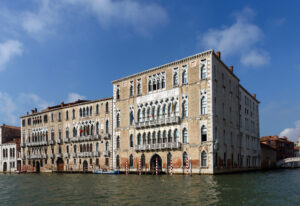Founded in 1868 as the first Advanced School of Commerce in Italy, the Ca’ Foscari University of Venice main office is in the heart of Venice, on the Canal Grande. It is a modern international University within a delicate environment. A leading university for academic excellence, it aims to attract and promote talent on a global scale, develop research and university-industry collaborations, and enhance its impact and the circulation of knowledge.
Ca’ Foscari offers highly qualified education and promotes frontier research in physical and digital sciences and the Social Sciences and Humanities (SSH). Rooted in a century-old tradition in languages (39 languages are taught here), economics and management. It is a member of 7 international innovation networks and of several national technological clusters and Regional Innovation Networks.
Ca’ Foscari University has the role of leader for the Cultural Heritage 2.0 project thanks to its expertise in educational innovation and collaborative projects. Furthermore, through its office PInK – Promoting Innovation and Knowledge, the University connects researchers and enterprises to foster entrepreneurship, innovation, and ‘cross-fertilisation’ knowledge sharing. Ca’ Foscari also hosts degree courses in Arts Management and Digital and Public Humanities and is home of the laboratory in Management of Arts and Culture (M.A.C. Lab), serving as a hub for research and teaching activities at the crossroads of management, creativity and cultural productions.
A cultural city “par excellence”, with intrinsic and systemic criticalities, Venice offers a key scenario for digital and business models’ transformation of cultural heritage, having the University as an expediter for knowledge transfer, innovation and upswing, in particular concerning post-Covid needs.

The main research objective that Ca’ Foscari University, has with this project is to bridge the gap between knowledge and skills in the cultural heritage field. This is a necessary step to continue experiencing, producing and working with culture in a world that is evolving. Ca’ Foscari, as the leader of the Cultural Heritage 2.0 project, aims to proactively work with the partners to develop strong collaborations between universities and cultural institutions to support the cultural sector, through the reorganisation of business models, the creation and implementation of synergies, new knowledge transfer, and through the development of innovative resources and digital skills.
Prof. Maria Lusiani, project coordinator for Ca’ Foscari, states “The signal is clear: you cannot continue to work in culture and train new professionals without lifting your head from your books. Studying is essential, but it is necessary to touch a changing reality first-hand.” The pandemic has been an eye-opener for cultural organisations, forcing them to reflect on their own possibilities of existence and survival, but also of change and renewal. We believe that this project can be very helpful for both those who work in the world of culture and – as in our case – in universities, where future professionals in the sector are trained. Thanks to this project, we aim to understand, together with institutions and organisations that collaborate in the cultural sector, what the future scenarios may be, what the needs are and what skills should be developed in order to work in the cultural field and help them evolve and improve.
This project represents a huge challenge for all the institutions involved because it means rethinking the cultural heritage and the future of cultural institutions as universities. The research we will share with students will help them become future generations of cultural operators.
By Daniela Pavan


